BUY IT AT AMAZON: CLICK HERE!
STUDIO: Warner Home Video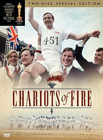 MSRP: $26.99 RATED: PG
MSRP: $26.99 RATED: PG
RUNNING TIME: 124 Minutes
SPECIAL FEATURES:
• Available subtitles: English, Spanish, French
• Available Audio Tracks: remastered (Dolby Digital 5.1), French (Dolby Digital 2.0 Mono)
• Commentary by director Hugh Hudson
• Remastered sound and picture
• "Wings on Their Heels: The Making of Chariots of Fire"
• "Chariots of Fire – A Reunion" (Filmed during afternoon tea on Lord Puttnam’s estate)
• 16 minutes of deleted scenes
• Actor screen tests
• Trailer
Despite having the motor skills of a large fat slab of human flesh, I’m a sucker for sports movies. I cried at the end of Remember the Titans, I really loved Rudy when I was little, and I thoroughly enjoyed the forgettable Miracle. When well done, I think these films can inspire us by saying it’s possible to do more than we now think is possible within our means. But, admittedly, they’re all pretty formulaic, if you get right down to it. A sports team participates in some large competition, usually with many obstacles prior, in order to win the championship and be victorious in the end. Cue grand music. Cue shots of the spectators jumping up and down for joy, people hugging each other. Cue victory shot of the team as the main characters are carried off the field.
Cue Chariots of Fire, the winner of the Best Picture Oscar in 1981. How does it measure up to modern sports films?
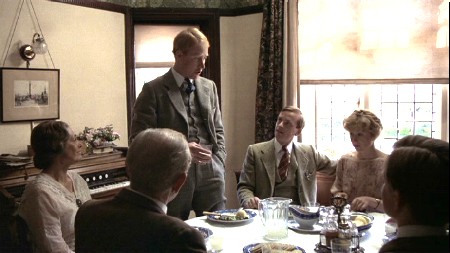
"I swear, mum, as God and you all as my witnesses, I’ll shake off the dust of this one horse town, go to New York City, and make it big at NBC or my name isn’t Conan O’Brien!"
The Flick
England, 1919. Harold Abrahams (Ben Cross) and Aubrey Montague (Nicholas Farrell) are both students who meet as they are about to arrive at Cambridge University shortly after World War I. After they settle in to school, we quickly find that Mr. Abrahams is one of the fastest men around, being the only person in 700 years to complete “The Cambridge College Dash,” which requires a run around the perimeter of the Cambridge Courtyard within 12 strokes of the clock. The school’s stuck-up headmasters (John Gielgud and Lindsay Anderson) witness the spectacle, and agree that this young Jewish man is destined for great things.
Some miles away, we meet Eric Liddell (Ian Charleson), a Christian Scot who is slated to assume control of a mission in China. Missionary work runs in his family, and Liddell’s sister, Jennie (Cheryl Campbell), is quite devoted to the cause as well. But although Liddell is intent on following God’s will and going to China, he also recognizes that God has given him the ability to run really really fast.
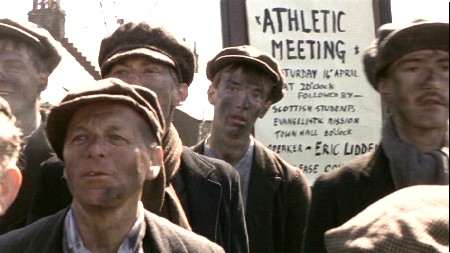
At the latest Rugby meeting of the Coalfaces, team captains desperately try to restore the team’s long-broken morale.
The two men train hard to develop their innate talents, and after the requisite training montages, both men end up at the Paris 1924 Olympics, competing under the flag of Great Britain. While Chariots of Fire definitely contains some of the sports clichés I mentioned earlier, it takes a different approach to the sports film. Rather than focus on painstakingly recreating the finer details of the real-life sporting events depicted, it ops for a much more moody approach, with high-speed cameras shooting in ultra slow motion to capture the emotion and intense atmosphere of the race. And rather than falling back on tired devices such as the father-trying-to-live-out-his-dreams-through-his-son, or the prize-that-I-must-win-to-help-save-the-community, the film relies on the parallel and internal struggles of Abrahams and Lidell to build up conflict and dramatic tension.
Abrahams is a Jew, struggling to find his place as an Englishman in a world that still makes such racial distinctions. He uses running as a “weapon” to achieve significance and greatness for himself, and as a symbolic validation of his existence. He puts everything he has into running, which makes his loss to Liddell in a pre-Olympic race midway through the film particularly crushing. He lives in a world that does not make sense if he is not the fastest one there is, and his battle is one with his inner demons, to find self-worth in more than just his speed.
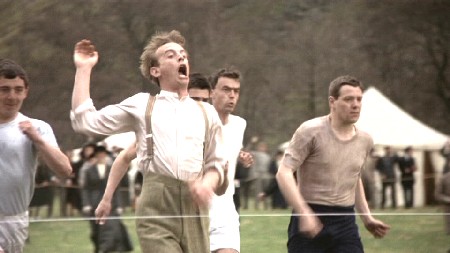
The runners each had a secret weapon for ensuring victory. For Liddell, it was his Flying Mouth of Doom…
On the other hand, Liddell struggles with his commitment to his faith. To me, Liddell’s character was more interesting since he tries to use his faith to justify his participation in the games. One of the most moving exchanges in the film is when he shares with his sister why he feels he must run, because he believes God made him fast and when he runs, he “feels [God’s] pleasure.” His commitment to God becomes even more important later in the film, when he struggles with a choice not to run in a qualifying heat on the Sabbath, a decision that would have effectively disqualified him from the competition.
In order to make these “man vs. self” conflicts compelling, the script had to be incredibly solid, and indeed, Colin Welland’s Oscar-award winning screenplay delivers on all fronts. Dialogues, monologues, soliloquies, and important speeches in front of large groups of people are all present in full force here. A young Ben Cross and Ian Charleson give spectacular performances as the two leads, even as they are surrounded by demonstrably more experienced actors, but they are buoyed in no small part by the superb writing. Abraham’s dialogue sometimes borders on melodramatic, but ultimately, I would be hard-pressed to find a more quotable film that’s just really satisfying to listen to. And speaking of listening, Vangelis’ score is still classic after all these years, though at times, the electronic 80’s sound of it can feel jarring and out of place in a 1920s period piece.
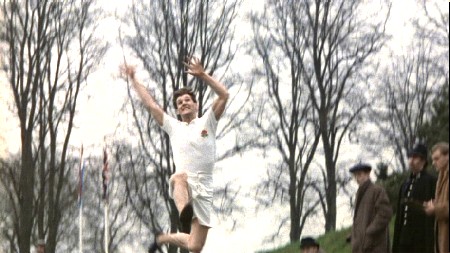
…whereas for Abrahams, it was his Jumpin Smile of Joy.
To be sure, there are many other characters in the film as well. Ian Holm is wonderful as Sam Mussabini, Abraham’s professional trainer, and Alice Krige is radiant as Sybil Gordon, Abraham’s love interest. Cheryl Campbell is great as Jennie, an ice-cold wet blanket on Liddell’s running aspirations. These characters and many more are all separate strands, drawn together by the simple story of two men trying to win a race. When taken together, they elevate this from a simple sports film to nothing less than an epic.
In my humble opinion, though, the film isn’t perfect. The Montague character (who basically occupies the same place here as the Ethan Hawke character in Dead Poet’s Society) isn’t particularly dynamic or deep, and the funeral scenes that bookend the film are done in Saving Private Ryan-like fashion, seeming almost like an irrelevant afterthought. I realize that the scenes were intended to contextualize the film within Great Britain’s broader history and elevate the film above the status of just a “period piece”, but they just didn’t work for me and felt unnecessary.
However, in the end, this is a near-flawless film about more than just racing. Chariots of Fire is a satisfying exploration of the human psyche, and the desire to win that dwells in all of us.
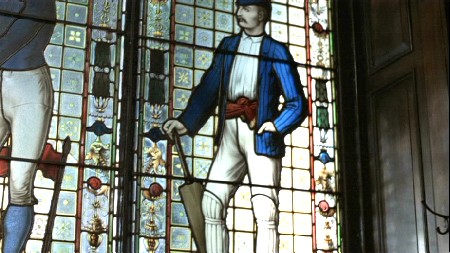
Modern church stained-glass windows just don’t have the same reverence as those from the olden days…
8.8 out of 10
The Look
Despite a much-vaunted “digitally remastered” print of the film with a 1.85:1 aspect ratio, in general, this transfer is a very mixed bag. I’d say for at least half of the film, the image is noticeably plagued with excessive graininess, compression artifacts, and washed out colors. Sometimes it goes away or becomes less noticeable but returns in other scenes with a vengeance. I was able to ignore the poor image quality that occurred in certain scenes, but only after awhile into the flick. Chariots of Fire was made in 1981, but from the image quality it looks like it was made in the 1960s. Not good.
6.5 out of 10
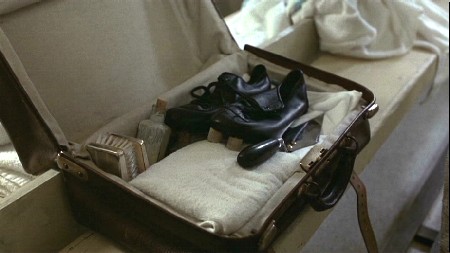
Sparky’s emergency kit, which he carried with him everywhere, always contained some dress shoes, a towel, some shoe brushes, and a special emergency cake-cutter, for every possible celebratory occasion.
The Noise
Chariots of Fire is presented in Dolby Digital Surround 5.1, but you can hardly tell at all. With very few exceptions, there is almost no usage of the surround channels, and it might as well be in mono. You will not hear the surging noises of the crowd at the Olympics, nor the ambient sounds of a train station on this DVD. Not only that, it’s not particularly good mono; the sound effects actually are passable, but much of the dialogue sounds muffled. In all, a disappointing mix.
The strange thing is that whenever there is music (not just the score, but any music at all, such as when the characters are singing), the surround channels come to life, and the quality of the track is much improved. The difference is almost jarring, and it offers but a taste of what this mix could have been.
6.5 out of 10
The Goodies
As usual, the special features are split up, with commentary on the first disc, everything else on the second.
Commentary by Director Hugh Hudson is a pretty good listen, as Hudson offers a fairly technical commentary on the film’s shoot. He spends a little bit of time recounting what’s going on screen, and there’s a good amount of silence, but by and large, it’s quite informative and interesting, and his style and British accent reminds me of the Ridley Scott commentaries I’ve listened to in the past, which can only be a good thing.
Wings on Their Heels: The Making of Chariots of Fire (27:13) is a documentary that looks like it was made with recently conducted interviews. It’s basically a bunch of talking heads, albeit interesting talking heads, discussing the process they went through to make the film. It is spliced with relevant footage from the film and from the Oscar ceremony where the film took home 4 awards. It’s cool to see these actors, decades after the movie, talking about their experiences in making it. My only complaint is that I felt it could have been longer and more in-depth.
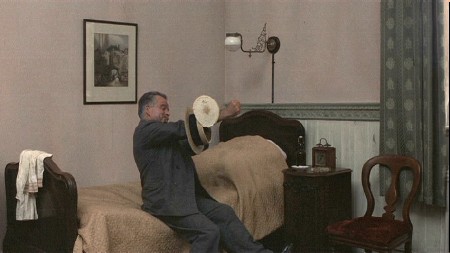
Sick of having to fork over extra cash, Ian Holm reacts angrily to the latest Fifth Element quadruple dip.
Chariots of Fire: A Reunion (18:55) is a nice little featurette that brings together a couple of the characters from the film, and a lot of the film’s creative talent in one room after all these years. It’s basically just a bunch of guys talking about old times, reliving the film’s shoot, and sharing interesting anecdotes about how they got involved with the film and their memories of being involved. It looks like it was shot in the same room/house where a lot of the interview footage for the other documentary was shot as well. There are some pretty interesting stories here, and not very much overlap with the other documentary. Good stuff.
There are 16 minutes worth of Deleted Scenes, one of which (“Cricket in the Ballroom”) includes a commentary by the director, who explains why it was removed for the U.S. release of the film. It’s a shame, as the scene is great and its placement at the beginning of the film would have really helped to set the tone for some for some of the main characters. The other 6 scenes are mildly interesting, but very redundant when viewed in light of the material already in the film. The movie doesn’t really lose anything without these scenes in, and they were probably rightfully cut for timing purposes.
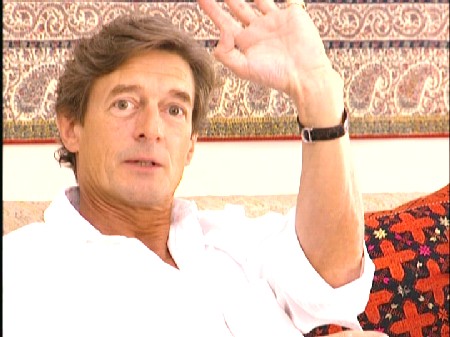
Nigel Havers wrist owns Val Kilmer’s elbow.
Also, in the Deleted Scenes menu you can find two incredibly short easter eggs. One is Nigel Havers talking with the director and producer about filming "The College Dash." The other one is Ben Cross discussing the famous opening shot of all the men running along the beach.
“Screen Tests” for Ian Charleson and Ben Cross are included, as well as a “Theatrical Trailer.”
It’s a solid set of special features, and tells a lot about the background of the film, but I felt that for a film of this scope, the interviews/featurettes could have been more detailed/organized, and perhaps the first disc could have used another commentary. Especially since according to the DVD box, it’s supposed to be a “Winner’s Circle of Extras!”
7.5 out of 10
The Artwork
 I like the color scheme of the box art a lot, but the cover just seems a tad too busy for me. Liddell is being hoisted up by his colleagues in a moment of victory, while a nice font displays the film’s title over the iconic image of the men training/running along a beach. A gold strip at the top explains that this is the “Two-Disc Special Edition,” while a black box to the side proudly declares that the film won Best Picture in 1981.
I like the color scheme of the box art a lot, but the cover just seems a tad too busy for me. Liddell is being hoisted up by his colleagues in a moment of victory, while a nice font displays the film’s title over the iconic image of the men training/running along a beach. A gold strip at the top explains that this is the “Two-Disc Special Edition,” while a black box to the side proudly declares that the film won Best Picture in 1981.
I think simplicity would have made for a more memorable cover, but this ain’t too bad in my book.
7.5 out of 10